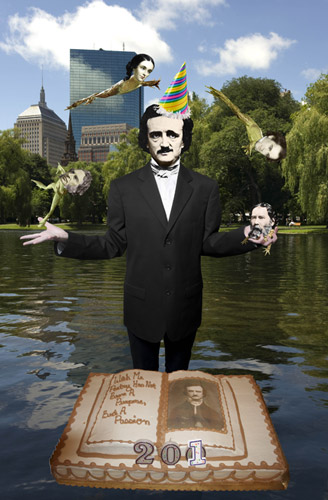
Happy 201st birthday, EAP.
Considering that the man was the original architect of the
detective story -- that'd be The Murders in the Rue Morgue -- it’s only fitting that we celebrate the birthday of Edgar Allan
Poe with a riddle. Which city can rightfully claim the legacy of Poe:
Baltimore,
Philadelphia, or Boston?
Before
we go any further, we'd like to own up to the fact that we've missed
Poe's birthday by two whole days. But, hey, in our defense, if the Poe Toaster -- the mysterious entity who's been leaving roses and cognac on Poe's grave since 1949 -- can be egregiously late, so can we. (At least, we're hoping
the Toaster's just running late, rather than something more serious.)
Anyway, back to Poe and scholarly jingoism. Most of us have long grown accustomed to associating Poe with
Baltimore, where he died of an undetermined illness in 1849 (the most colorful explanation is that he was a victim of cooping,
an act of voting fraud so corrupt, it makes ACORN look classy). But, according to some EAP fiends, his death is where B-more's
hold on Poe ends.
At
the Great Poe Debate, a marvelously peevish literary scrum held this
past December at the Boston Public Library, distinguished Poe experts
lobbed a barrage of analytical bombs at each other to fight for their
respective cities' entitlement to the man's genius. Our combatants:
#1: Taking Philadelphia's side is Edward Pettit, “the Philly Poe guy,”
who argues that the city served as "the crucible for Poe's imaginative
genius." One wouldn’t ordinarily point to the City of Brotherly Love as
the obvious paragon of Poesy, but
Pettit -- the man who got this whole debate show on the road in the
first place -- makes the not-totally-unconvincing point that Poe kicked
off a literary tradition of “Philadelphia gothic,” and that it
was Philly that inspired some of the writer's greatest works … by being
a filthy,
roiling cauldron of crime, poverty, and disease. (Hey, if the shoe
fits.) Oh, and let's not overlook the fact that Poe belongs to the city
because it's the law.
#2: Paul Lewis, curator of the BPL's current Poe exhibit and a professor of English at Boston College,
took perhaps the most underdog position: that Boston is especially
deserving of top-of-the-heap status when it comes to Poe. For while our
fair city may have received a fair amount of Edgar's bile, "we never
put [him] in jail here in Boston, we never knocked him down, we
never cheated him out of a poetry award that he legitimately won"
(unlike Philly) or ransacked his grave like Baltimore did. Moreover,
Poe had deep ties to the Bean: he was born here; he came back here when he needed cash; and he was apparently so emotionally attached to this city, he even tried commit suicide here. And now we have a square named after him. So there.
#3: Jeff Jerome, curator of the Edgar Allan Poe House and Museum
since
1978 (and personal witness of the Poe Toaster's annual rounds), held
Baltimore's ground. And he did an admirable job of it, despite the
other two challengers' best efforts to rhetorically brick him up, "Cask of Amontillado"-style. Jerome also left himself wide open for a few good-natured
barbs like this one from feisty debate moderator Charlie Pierce:
"I think we can all agree,
when we think of being buried alive, we think of Baltimore."
So who won? You’ll have to listen to the end, where a "surprise guest
judge" declares the victor … sort of. (Like the rest of the debate, the finale is rather astonishing -- do not miss.) Then go check out the corresponding Poe exhibit at the BPL, on view through March 31.
DOWNLOAD: “The Great Poe Debate” [MP3]
Recorded live at the Boston Public Library, on December 17, 2009. To subscribe to this podcast, paste this RSS feed into your podcatcher or feed-reader of choice, or bookmark //thephoenix.com/podcast.
















